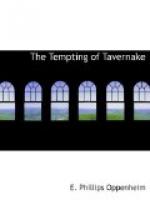he started from the back and came toward the front.
About three-quarters of the way there, he paused.
It was very simple, after all. The solid wall
for a couple of feet suddenly ceased, and the design
was continued with an expanse of stretched canvas,
which yielded easily to his finger. He leaned
his ear against it; he could hear now distinctly the
sound of voices—he heard even the woman’s
laughter. For the height of about four feet the
wall had been bodily removed. He made a small
hole in the canvas—there was still darkness.
He enlarged the hole until he could thrust his hand
through—there was nothing but canvas the
other side. He knew now where he was.
There was only that single thickness of canvas between
him and the room. He had but to make the smallest
hole in it and he would be able to see through.
Even now, with the removal of the barrier on his
side, the voices were more distinct. A complete
section of the wall had evidently been taken out and
replaced by a detachable framework of wood covered
with stretched canvas. He stood back for a moment
and felt with his finger; he could almost trace the
spot where the woodwork fitted upon hinges.
Then he went on his hands and knees again, and with
his penknife in his hand he paused to listen.
He could hear the man Crease talking—a
slow, nasal drawl. Then he heard Pritchard’s
voice, followed by what seemed to be a groan.
There was a silence, then Elizabeth seemed to ask
a question. He heard her low laugh and some
note in it sent a shiver through his body. Pritchard
was speaking fiercely now. Then, in the middle
of his sentence, there was silence once more, followed
by another groan. He could almost feel the people
in that room holding their breaths.
Tavernake was rapidly forgetting all caution.
The point of his knife was through the canvas.
Slowly he worked it round until a small piece, the
size of a half-crown, was partially cut through.
With infinite pains he got his head and shoulders into
the small recess and for the first time looked into
the room. Pritchard was sitting almost in the
middle of the apartment; his arms seemed to be bound
to the chair and his legs were tied together.
A few yards away, Elizabeth, her fur coat laid aside,
was lounging back in an easy-chair, her dress all
glittering with sequins, a curious light in her eyes,
a cruel smile parting her lips. By her side—sitting,
in fact, on the arm of her chair —was Crease,
his long, worn face paler, even, than usual; his lips
curled in a smile of cynical amusement. Major
Post was there, carefully dressed as though he had
been attending some social gathering, standing upon
the hearth-rug with his coat-tails under his arms.
The professor, in whose face seemed written the most
abject terror, was talking. Tavernake now could
hear every word distinctly.
“My dear Elizabeth! My dear Crease!
You are both too precipitate! I tell you that
I protest—I protest most strongly.
Mr. Pritchard, I am sure, with a little persuasion,
will listen to reason. I will not be a party
to any such proceeding as—as this.
You understand, Crease? We have gone quite far
enough as it is. I will not have it.”




